人教新课标必修三 Unit 2 Healthy eating情态动词讲解
人教版 必修三 Unit 2 Healthy eating(语法与写作)教案-最新教学文档
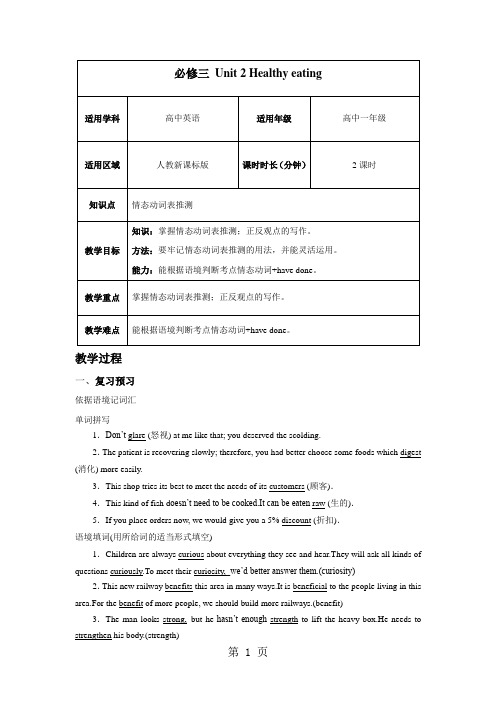
教学过程一、复习预习依据语境记词汇单词拼写1.Don’t glare (怒视) at me like that; you deserved the scolding.2.The patient is recovering slowly; therefore, you had better choose some foods which digest (消化) more easily.3.This shop tries its best to meet the needs of its customers (顾客).4.This kind of fish d oesn’t need to be cooked.It can be eaten raw (生的).5.If you place orders now, we would give you a 5% discount (折扣).语境填词(用所给词的适当形式填空)1.Children are always curious about everything they see and hear.They will ask all kinds of questions curiously.To meet their curiosity,_we’d better answer them.(curiosity) 2.This new railway benefits this area in many ways.It is beneficial to the people living in this area.For the benefit of more people, we should build more railways.(benefit)3.The man looks strong,_but he hasn’t enough strength to lift the heavy box.He needs to strengthen his body.(strength)二、课堂导入复习上节课情态动词概念概念:在动词(一般动词)之前形成动词的否定,疑问,时态,语态,语气或表示特殊意义的动词叫做助动词,其中具有感情色彩一些助动词叫做情态动词。
人教版新课标高一英语Book3unit2Healthyeating情态动词归纳
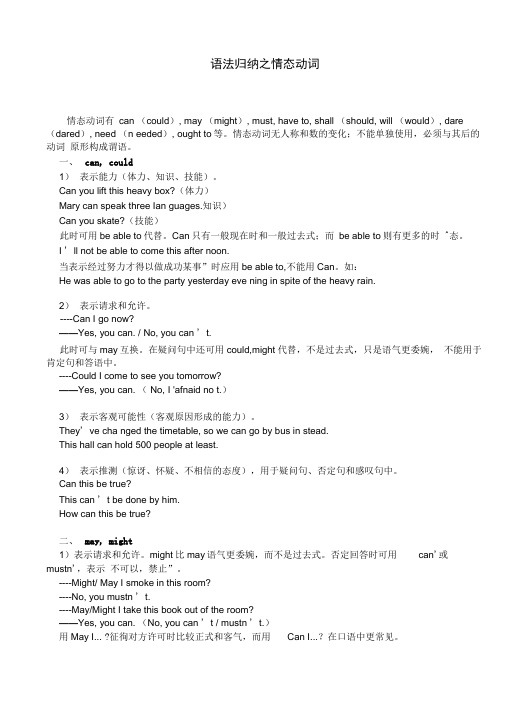
语法归纳之情态动词情态动词有can (could), may (might), must, have to, shall (should, will (would), dare (dared), need (n eeded), ought to等。
情态动词无人称和数的变化;不能单独使用,必须与其后的动词原形构成谓语。
一、can, could1)表示能力(体力、知识、技能)。
Can you lift this heavy box?(体力)Mary can speak three Ian guages.知识)Can you skate?(技能)此时可用be able to代替。
Can只有一般现在时和一般过去式;而be able to则有更多的时 ^态。
I ' ll not be able to come this after noon.当表示经过努力才得以做成功某事”时应用be able to,不能用Can。
如:He was able to go to the party yesterday eve ning in spite of the heavy rain.2)表示请求和允许。
---- C an I go now?——Yes, you can. / No, you can ' t.此时可与may互换。
在疑问句中还可用could,might代替,不是过去式,只是语气更委婉,不能用于肯定句和答语中。
----Could I come to see you tomorrow?——Yes, you can. ( No, I 'afnaid no t.)3)表示客观可能性(客观原因形成的能力)。
They' ve cha nged the timetable, so we can go by bus in stead.This hall can hold 500 people at least.4)表示推测(惊讶、怀疑、不相信的态度),用于疑问句、否定句和感叹句中。
【英语】新人教必修3 语法·剖析(Unit 2 Healthy eating)
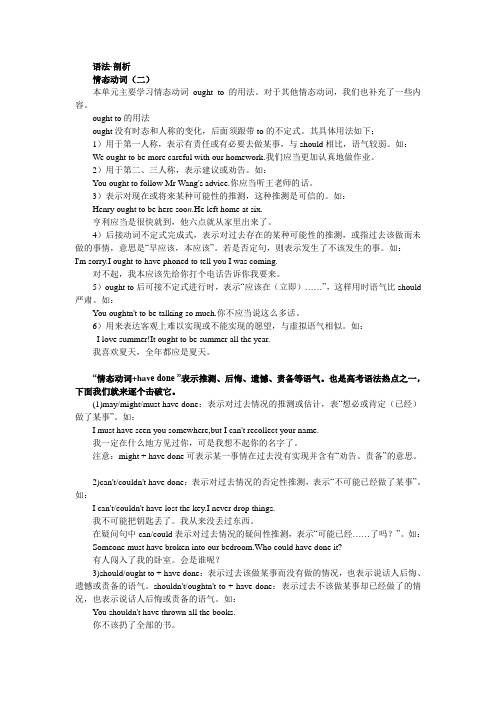
语法·剖析情态动词(二)本单元主要学习情态动词ought to 的用法。
对于其他情态动词,我们也补充了一些内容。
ought to的用法ought没有时态和人称的变化,后面须跟带to的不定式。
其具体用法如下:1)用于第一人称,表示有责任或有必要去做某事,与should相比,语气较弱。
如: We ought to be more careful with our homework.我们应当更加认真地做作业。
2)用于第二、三人称,表示建议或劝告。
如:You ought to follow Mr Wang's advice.你应当听王老师的话。
3)表示对现在或将来某种可能性的推测,这种推测是可信的。
如:Henry ought to be here soo n.He left home at six.亨利应当是很快就到,他六点就从家里出来了。
4)后接动词不定式完成式,表示对过去存在的某种可能性的推测,或指过去该做而未做的事情,意思是“早应该,本应该”。
若是否定句,则表示发生了不该发生的事。
如:I'm sorry.I ought to have phoned to tell you I was coming.对不起,我本应该先给你打个电话告诉你我要来。
5)ought to后可接不定式进行时,表示“应该在(立即)……”,这样用时语气比should 严肃。
如:You oughtn't to be talking so much.你不应当说这么多话。
6)用来表达客观上难以实现或不能实现的愿望,与虚拟语气相似。
如:I love summer!It ought to be summer all the year.我喜欢夏天,全年都应是夏天。
“情态动词+hav e done ”表示推测、后悔、遗憾、责备等语气。
也是高考语法热点之一,下面我们就来逐个击破它。
(1)may/might/must have done:表示对过去情况的推测或估计,表“想必或肯定(已经)做了某事”。
高考英语 Unit2《Healthy eating》知识与要点课件 新人教必修3
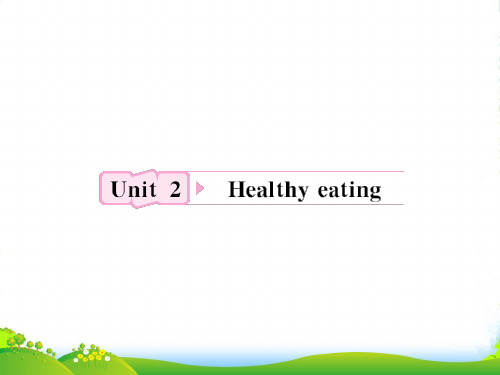
【答案】 A
4.strength n.[U]力气,力量;[C]强项,长处;优点 归纳拓展 (1)strong (adj.)强壮的→strength (n.)力量→strengthen (v.) 加强;增强→strengthless (adj.)无力的 (2)相关短语 build up one's strength增强实力/体力 at full strength满员,满额 in (great) strength人多势众地
He kept his balance with his arms on top of the wall. 他在墙上用双臂保持平衡。 I think on balance I prefer the new system. 总的说来,我觉得自己更喜欢新体制。 You should balance the advantages against the disadvantages before your final decision. 在作出决定之前,你一定要权衡利弊。
重点 短语
be/go on a diet,ought to,lose weight,get away with,tell a lie/lies,win...back,in debt,spy on,cut down,before long, earn one's living,put on weight,glare at,benefit from
【链接训练】
①The boy ________ on the ground ________ that he had
seen a cock ________ an egg.
A.laying;lay;lay
B.lying;lie;lie
人教版必修三Unit2Healthy eating Grammar

[点津 ]
ought to 的否定形式为 ought not to (oughtn’t to);
一般疑问形式是将 ought 提至句首, 其否定答语通常用 don' t have to 或 needn't。 —Ought he to see the doctor? 他该去看医生吗? —Yes, he ought to./No, he don' t have to. 是的,他该去。 /不,他不必去。 You ought not to make this kind of mistake again. 你不应该再犯这种错误了。
(4)need have done 表示“本需要做而实际未做”; needn't have done 表示“本不必做某事而实际做了”。 You need have done it instead of him yesterday. 昨天你本需要代替他做那件事的。 You needn' t have woken me up; I don' t have to go to work today. 你本来不必叫醒我,今天我不用上班。
5.这辆自行车需要修理。 The bike needs repairing/to be repaired .
(5)may/might have done 表示对过去发生的事情的推测,意思 是“也许已经做了某事,可能已经做了某事”,多用在肯定 句中,用 might 时表示语气更加不肯定。 You might have read about it in the papers. 你可能已经在报上看过这个消息了。
Ⅰ.选词填空 1.You mustn't needn't) 2.It's so near; we shouldn't have taken a taxi.(shouldn't/can't) 3.You oughtn't to have spent so much time playing computer games.(mustn't/oughtn't to) 4.—Shall I leave the room so that you two can talk? —No, you needn't .(mustn't/needn't) go there alone; it's too dangerous.(mustn't/
人教版高中英语必修三Unit2Healthyeating课文知识点解析

高中英语学习材料madeofjingetiejiUnit 2 Healthy eating 课文知识点解析Reading:Come and Eat Here(Ⅰ)1.Wang Pengwei sat in his empty restaurant feeling very frustrated.王鹏伟坐在他空荡荡的餐馆里,感觉很失落。
feeling现在分词,作伴随状语。
e.g.Standing on the top of the hill,you can have a better view of the city.站在山顶上,你能更好地看到这个城市.Jeff shouted,seizing her arm.杰夫抓住她的胳膊,喊叫着。
Seeing from the top of the hill,we can see the whole city. 从山顶上我们可以看到整个城市.2.He thought of his mutton kebabs and fatty pork cooked in the hottest,finest oil.他想到了他的在热的最好的油里炸出来的烤羊肉和肥肉。
cooked 过去分词短语,作后置定语(被动)。
e.g.I know a girl called Mary.我认识一个叫玛丽的女孩。
English is a language spoken all around the world.英语是全世界都说的一种语言。
3.His fried rice was hot but did not taste of fat.他的热而不腻的米饭。
taste of sth. 有某种味道e.g.It tastes strongly of mint.它有挺重的薄荷味。
taste 能辨别(味道);尝出,品出。
(不用于进行时,常与can连用)e.g.I can’t taste.I’ve got a cold.我得了感冒,尝不出味来。
必修3 Unit 2 Healthy eating 情态动词(2)
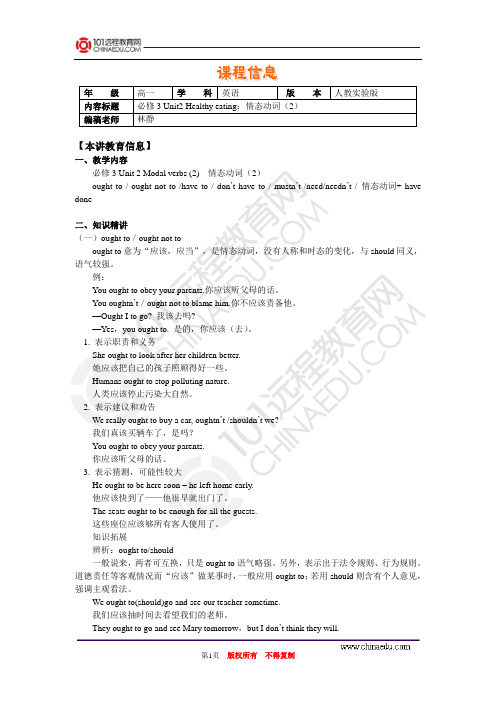
【本讲教育信息】一、教学内容必修3 Unit 2 Modal verbs (2) 情态动词(2)ought to / ought not to /have to / don‘t have to / mustn‘t /need/needn‘t / 情态动词+ have done二、知识精讲(一)ought to/ought not toought to意为“应该,应当”,是情态动词,没有人称和时态的变化,与should同义,语气较强。
例:You ought to obey your parents.你应该听父母的话。
You oughtn‘t/ought not to blame him.你不应该责备他。
—Ought I to go? 我该去吗?—Yes,you ought to. 是的,你应该(去)。
1. 表示职责和义务She ought to look after her children better.她应该把自己的孩子照顾得好一些。
Humans ought to stop polluting nature.人类应该停止污染大自然。
2. 表示建议和劝告We really ought to buy a car, oughtn‘t /shouldn‘t we?我们真该买辆车了,是吗?You ought to obey your parents.你应该听父母的话。
3. 表示猜测,可能性较大He ought to be here soon – he left home early.他应该快到了——他很早就出门了。
The seats ought to be enough for all the guests.这些座位应该够所有客人使用了。
知识拓展辨析:ought to/should一般说来,两者可互换,只是ought to语气略强。
另外,表示出于法令规则、行为规则、道德责任等客观情况而“应该”做某事时,一般应用ought to;若用should则含有个人意见,强调主观看法。
人教版 必修三 Unit 2 Healthy eating(语法与写作)教案
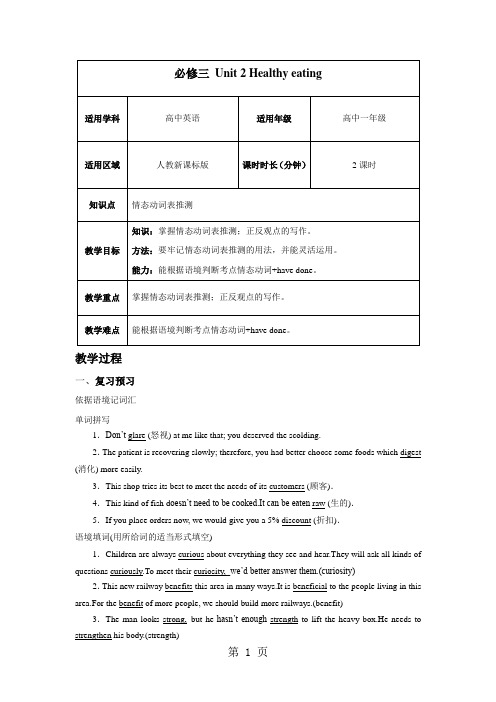
教学过程一、复习预习依据语境记词汇单词拼写1.Don’t glare (怒视) at me like that; you deserved the scolding.2.The patient is recovering slowly; therefore, you had better choose some foods which digest (消化) more easily.3.This shop tries its best to meet the needs of its customers (顾客).4.This kind of fish d oesn’t need to be cooked.It can be eaten raw (生的).5.If you place orders now, we would give you a 5% discount (折扣).语境填词(用所给词的适当形式填空)1.Children are always curious about everything they see and hear.They will ask all kinds of questions curiously.To meet their curiosity,_we’d better answer them.(curiosity) 2.This new railway benefits this area in many ways.It is beneficial to the people living in this area.For the benefit of more people, we should build more railways.(benefit)3.The man looks strong,_but he hasn’t enough strength to lift the heavy box.He needs to strengthen his body.(strength)二、课堂导入复习上节课情态动词概念概念:在动词(一般动词)之前形成动词的否定,疑问,时态,语态,语气或表示特殊意义的动词叫做助动词,其中具有感情色彩一些助动词叫做情态动词。
人教版高中英语必修三:Unit2 Healthy eating-语法篇(学生版)
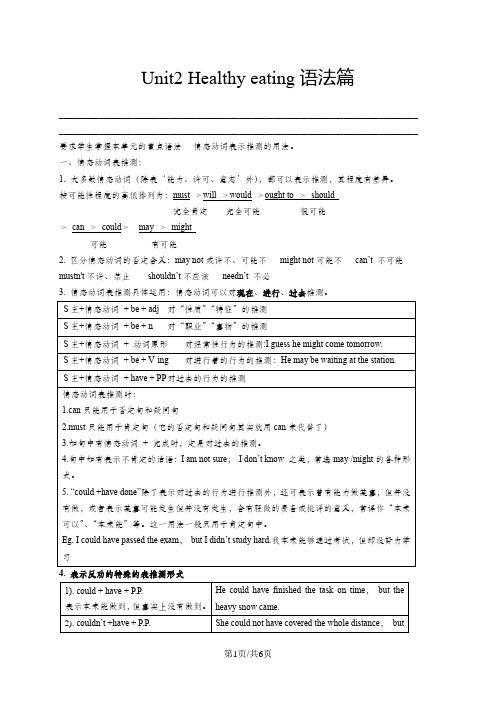
Unit2 Healthy eating语法篇__________________________________________________________________________________ __________________________________________________________________________________要求学生掌握本单元的重点语法----情态动词表示推测的用法。
一、情态动词表推测:1. 大多数情态动词(除表‘能力、许可、意志’外),都可以表示推测,其程度有差异。
按可能性程度的高低排列为:must ﹥will ﹥would ﹥ought to ﹥should完全肯定完全可能很可能﹥can ﹥could﹥may ﹥might可能有可能2. 区分情态动词的否定含义:may not或许不、可能不might not可能不can’t 不可能mustn't不许、禁止shouldn’t不应该needn’t 不必3. 情态动词表推测具体运用:情态动词可以对现在、进行、过去推测。
4. 表示反劝的特殊的表推测形式5. 注意:二、情态动词表推测的反意疑问句1.情态动词表推测的反意疑问句,简单来说,就是以情态动词后的时态为淮,如句子里有明确的时间状语,则以其为准。
2.以must 为例:Eg.1. You must be hungry now,aren’t you?2. He must be watching TV,isn’t he ?3 Tom must have lived her for a long time,hasn’t he ?4. She must have arrived yesterday,didn’t she?注:如选择题中(以She must have arrived yesterday,didn’t she?为例)既有didn’t she又有hasn’t she则以didn’t she?为最佳答案。
人教版高中英语必修三unit2常考知识点
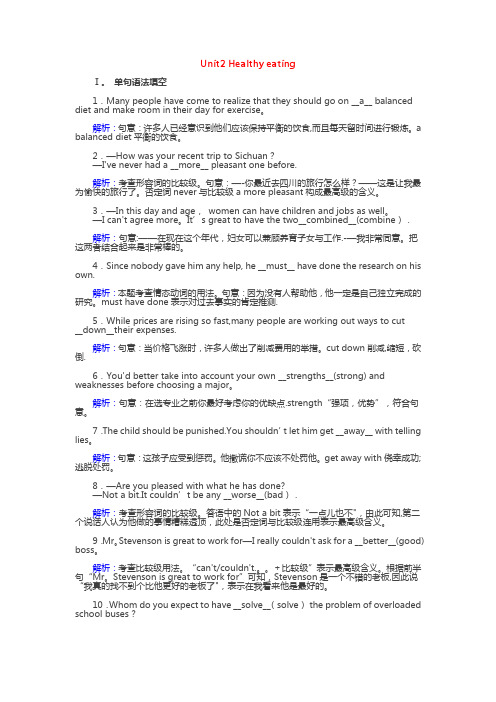
Unit2 Healthy eatingⅠ。
单句语法填空1.Many people have come to realize that they should go on __a__ balanced diet and make room in their day for exercise。
解析:句意:许多人已经意识到他们应该保持平衡的饮食,而且每天留时间进行锻炼。
a balanced diet平衡的饮食。
2.—How was your recent trip to Sichuan?—I've never had a __more__ pleasant one before.解析:考查形容词的比较级。
句意:—-你最近去四川的旅行怎么样?——这是让我最为愉快的旅行了。
否定词never与比较级a more pleasant构成最高级的含义。
3.—In this day and age,women can have children and jobs as well。
—I can't agree more。
It’s great to have the two__combined__(combine).解析:句意:——在现在这个年代,妇女可以兼顾养育子女与工作.-—我非常同意。
把这两者结合起来是非常棒的。
4.Since nobody gave him any help, he __must__ have done the research on his own.解析:本题考查情态动词的用法。
句意:因为没有人帮助他,他一定是自己独立完成的研究。
must have done表示对过去事实的肯定推测.5.While prices are rising so fast,many people are working out ways to cut__down__their expenses.解析:句意:当价格飞涨时,许多人做出了削减费用的举措。
2020人教版英语必修3 Unit 2 Healthy eating Period 5 情态动词(2)

Book3Unit2Healthy Eating Period5情态动词(2)编写:巩玉香学习目标:1)情态动词的can/could,may/might,must,should的表示推测的用法2)情态动词+have done的用法I.情态动词推测用法【品味典例】1)--Listen,someone is coming,who can it be?--It must be Tom.I saw him just now.--It can’t be him.He has gone home.。
--It may(not)be him,I am not sure.2)He must be reading in the classroom now.3)You must have a wrong number,”she said.“There’s no one of that name here.”4)He may have been to Beijing many times,hasn’t he?【归纳拓展】+do对现在的推测1.can/could may/might/must.+be doing是对正在进行的推测+have+过去分词,对过去或完成时态的推测句式限制及含义:must意为“一定,准是”,只用于肯定句,may/might意为“可能”,用于肯定或否定句,could意为“可能”,可用于各种句型can意为“可能”,用于疑问句,否定句注意:情态动词表推测的意思时,其反意疑问句的助动词要根据实际情况。
例如4),5)再如:推测用法:He must be Tom.不推测时实际情况是:He is Tom.所以:He must be Tom,isn’t he?2.Should/ought to=is probably“按道理应该”He started at five this morning,he ought to/should be there now.今天早晨五点他就出发了,这会儿该到那里了II.情态动词表责备:might/could/should/ought to/needn’t+have+p.p【品味典例】1)I shouldn’t have watched that movie—it’ll give me horrible dreams.2)Mark needn’t have hurried.After driving at top speed,he arrived half an hour early.3)What a pity.Considering his ability and experience,he might have done it better.【归纳拓展】might have+p.p表示说话人对已经发生了的事情提出缓和的批评责备could have+p.p用来批评某人没有完成某事“有能力做而实际没做”ought to/should have+p.p对该做而没做表示责备;否定句表示对不该做的而做的事表示责备needn’t have+pp表示某事“本来不必其实无须做的事而做了”达标练习:I.用适当的情态动词填空1.—Sorry,Mum!I failed the job interview again.—Oh,it's too bad.You__________have made full preparations.2.I__________have worried before I came to the new school,for my classmates here are very friendly to me.3.You____________be Carol.You haven’t changed a bit after all these years.4.I’ve ordered some pizza,so we__________worry about cooking when we get home tired.5.My book,The House of Hales,is missing.Who________have taken it?6.Life is unpredictable;even the poorest_____________become the richest.7.What do you mean,there are only ten tickets?There___________be twelve.8.---What are you doing this Saturday?---I’m not sure,but I go to the Rolling Stones concert.9.---I can’t find my purse anywhere.---You___________have lost it while shopping.10.---Why are your eyes so red?You___________not have slept well last night.—Yeah,I stayed up late writing a report.11.It is usually warm in my hometown in March,but it___________be rather cold sometimes. II.根据所给动词结合句意,用适当的情态动词与动词填空12.---I left my handbag on the train,but luckily someone gave it to a railway official.---How unbelievable to get it back!I mean,someone________________(steal)it.13.Harry is feeling uncomfortable.He_____________(drink)too much at the party last night.14.They____________(not finish)the work yesterday because it was so difficult.III.选词填空:can,may,might,can’t,could,wouldn’t,must,needn’t,mustn’t15.I__________thank you too much for all your help to my son while we were away from home.16.Liza___________well not want to go on the trip---he hates traveling.17.When I was a child,I_________watch TV whenever I wanted to.18.---____________I take the book out?---I'm afraid not.19.--May I take this book out of the reading room?---No,you__________.You read it in here.20.---__________you interrupt now?Can’t you see I’m on the phone?---Sorry Sir,but it’s urgent.21.Days later,my brother called to say he was all right,but______________say where he was.。
最新:人教版 必修三 Unit 2 Healthy eating(重点词汇 短语与句型) 教案-文档资料
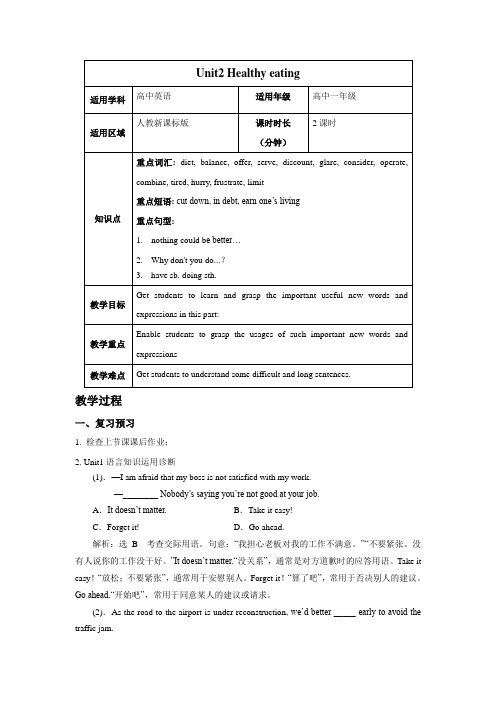
教学过程一、复习预习1. 检查上节课课后作业;2. Unit1语言知识运用诊断(1).—I am afraid that my boss is not satisfied with my work.—________ Nobody’s saying you’re not good at your job.A.It doesn’t matter.B.Take it easy!C.Forget it! D.Go ahead.解析:选B考查交际用语。
句意:“我担心老板对我的工作不满意。
”“不要紧张。
没有人说你的工作没干好。
”It doesn’t matter.“没关系”,通常是对方道歉时的应答用语。
Take it easy!“放松;不要紧张”,通常用于安慰别人。
Forget it!“算了吧”,常用于否决别人的建议。
Go ahead.“开始吧”,常用于同意某人的建议或请求。
(2).As the road to the airport is under reconstruction, we’d better _____ early to avoid the traffic jam.A.pay off B.set offC.put off D.take off解析:选B考查动词短语辨析。
句意:因为通向机场的道路正在重建中,我们最好早点出发以避免交通堵塞。
set off意为“出发”,符合题意。
pay off意为“还清;成功”;put off 意为“推迟”;take off意为“起飞;脱下”。
故选B。
(3).________ not to miss the flight at 15:20, the manager set out for the airport in a hurry.A.Reminding B.RemindedC.To remind D.Having reminded解析:选B考查非谓语动词作状语。
人教版高中英语 Book3 unit2 healthy eating单元知识点总结
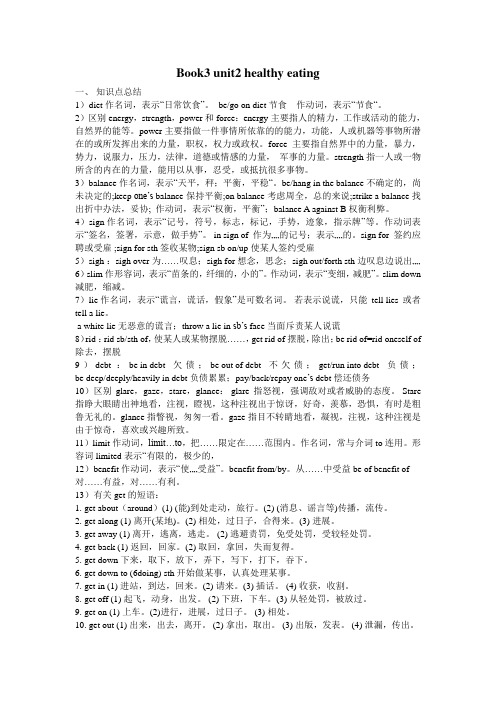
Book3 unit2 healthy eating一、知识点总结1)diet作名词,表示“日常饮食”。
be/go on diet节食作动词,表示“节食“。
2)区别energy,strength,power和force:energy主要指人的精力,工作或活动的能力,自然界的能等。
power主要指做一件事情所依靠的的能力,功能,人或机器等事物所潜在的或所发挥出来的力量,职权,权力或政权。
force主要指自然界中的力量,暴力,势力,说服力,压力,法律,道德或情感的力量,军事的力量。
strength指一人或一物所含的内在的力量,能用以从事,忍受,或抵抗很多事物。
3)balance作名词,表示“天平,秤;平衡,平稳“。
be/hang in the balance不确定的,尚未决定的;keep one’s balance保持平衡;on balance考虑周全,总的来说;strike a balance找出折中办法,妥协; 作动词,表示“权衡,平衡”;balance A against B权衡利弊。
4)sign 作名词,表示“记号,符号,标志,标记,手势,迹象,指示牌”等。
作动词表示“签名,签署,示意,做手势”。
in sign of作为……的记号;表示……的。
sign for签约应聘或受雇 ;sign for sth签收某物;sign sb on/up使某人签约受雇5)sigh :sigh over为……叹息;sigh for想念,思念;sigh out/forth sth边叹息边说出……6)slim 作形容词,表示“苗条的,纤细的,小的”。
作动词,表示“变细,减肥”。
slim down 减肥,缩减。
7)lie 作名词,表示“谎言,谎话,假象”是可数名词。
若表示说谎,只能tell lies或者tell a lie。
a white lie无恶意的谎言;throw a lie in sb’s face当面斥责某人说谎8)rid :rid sb/sth of,使某人或某物摆脱……,get rid of摆脱,除出;be rid of=rid oneself of 除去,摆脱9)debt :be in debt欠债;be out of debt不欠债;get/run into debt负债;be deep/deeply/heavily in debt负债累累;pay/back/repay one’s debt偿还债务10)区别glare,gaze,stare,glance: glare指怒视,强调敌对或者威胁的态度。
人教版高中英语必修三:Unit2 Healthy eating-语法篇(教师版)
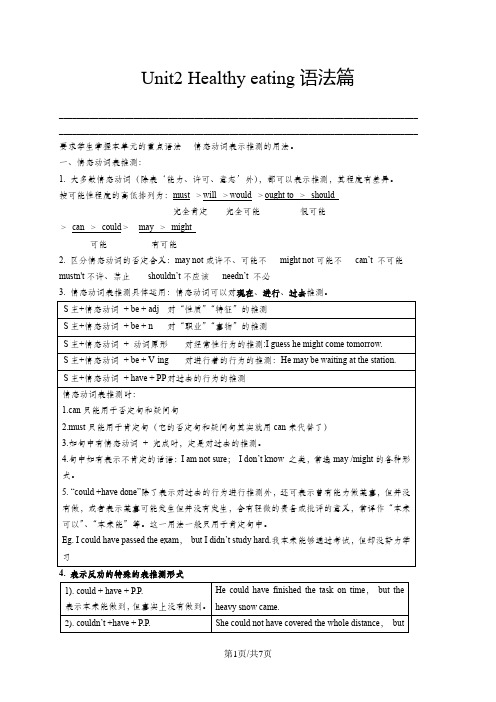
Unit2 Healthy eating语法篇__________________________________________________________________________________ __________________________________________________________________________________要求学生掌握本单元的重点语法----情态动词表示推测的用法。
一、情态动词表推测:1. 大多数情态动词(除表‘能力、许可、意志’外),都可以表示推测,其程度有差异。
按可能性程度的高低排列为:must ﹥will ﹥would ﹥ought to ﹥should完全肯定完全可能很可能﹥can ﹥could﹥may ﹥might可能有可能2. 区分情态动词的否定含义:may not或许不、可能不might not可能不can’t 不可能mustn't不许、禁止shouldn’t不应该needn’t 不必3. 情态动词表推测具体运用:情态动词可以对现在、进行、过去推测。
4. 表示反劝的特殊的表推测形式5. 注意:二、情态动词表推测的反意疑问句1.情态动词表推测的反意疑问句,简单来说,就是以情态动词后的时态为淮,如句子里有明确的时间状语,则以其为准。
2.以must 为例:Eg.1. You must be hungry now,aren’t you?2. He must be watching TV,isn’t he ?3 Tom must have lived her for a long time,hasn’t he ?4. She must have arrived yesterday,didn’t she?注:如选择题中(以She must have arrived yesterday,didn’t she?为例)既有didn’t she又有hasn’t she则以didn’t she?为最佳答案。
人教版高中英语必修三Unit2Healthyeating课文知识点解析
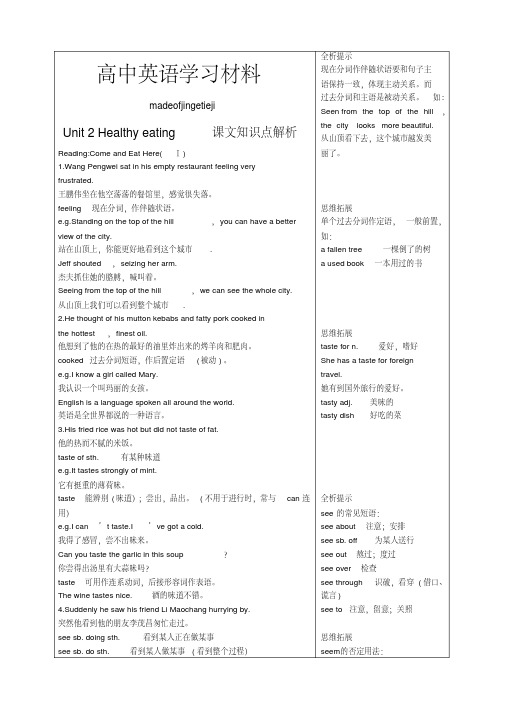
frustrated.
王鹏伟坐在他空荡荡的餐馆里,感觉很失落。
feeling 现在分词,作伴随状语。 e.g.Standing on the top of the hill
, you can have a better
view of the city.
站在山顶上,你能更好地看到这个城市 .
Jeff shouted , seizing her arm.
Can you taste the garlic in this soup
?
你尝得出汤里有大蒜味吗?
taste 可用作连系动词,后接形容词作表语。 The wine tastes nice. 酒的味道不错。
4.Suddenly he saw his friend Li Maochang hurrying by.
他的热而不腻的米饭。
taste of sth.
有某种味道
e.g.It tastes strongly of mint.
它有挺重的薄荷味。
taste 能辨别 ( 味道);尝出,品出。 ( 不用于进行时,常与 can 连
用)
e.g.I can ’ t taste.I ’ ve got a cold.
我得了感冒,尝不出味来。
prices.
王鹏伟感到很吃惊,尤其是饭菜的价格。
be amazed at... 对……感到吃惊
e.g.We were amazed at the news.
听到这个消息我们很吃惊。
amaze v. 使某人惊讶、惊奇 ( 多用于被动)
e.g.He amazed everyone by passing his driving test.
long walk.
新人教版高一英语必修3 Unit 2 Healthy eating 语法--情态动词(课件)
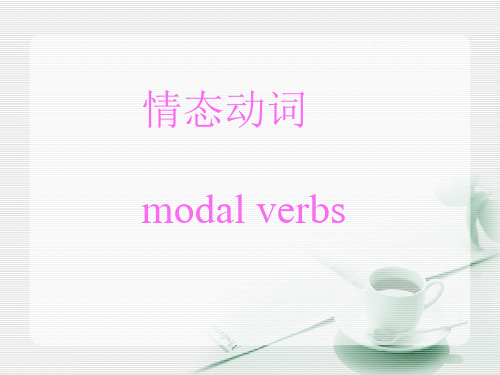
3. 如何回答may开头的问句: — May I smoke here? __ Yes, you may ./ Yes ,please. __ No, you can’t / No, you mustn’t ___No, you’d better not.
4. (1) may well “很有可能,完全,不妨” Eg. You may well say so. (2) may / might as well “还是…. 为好,最好” .Eg. You may as well tell him the truth .
Eg. You should have been five minutes ago. He shouldn’t have been so worried .
3. Should 表“竟然,竟会”,表说话人惊奇,愤怒、失望的感 情。
Eg. I am surprised that you should be so rude.
Eg. Shall I get you a cup of coEg. No person shall smoke here.
1.表示允诺 “将会” 2. 表“规定。保证” 3.表示命令/警告/威 胁 “必须”
2. Should / Ought to + have +done 表“本应该做而没做” Shouldn’t / Oughtn’t to + have +done 表“不该做却做了”
1、表示意愿。意志和决心
Will/ would
I’ll try my best to overcome the difficulty. 2、表示意图
What will you do?
3、表示请示允许
人教英语课件必修三Unit2HealthyeatingGrammar情态动词

______ hurt yourself.
A. won’t ; can’t C. shouldn’t ; must
✓B. mustn’t ; may
D. can’t ; shouldn’t
5. --XXX you stay for lunch?
--Sorry, _____. My brother is coming to see me.
9. Though he is clever, he __c_a_n__ do something foolish.
ought to
1) You oughtn’t to make private phone calls in work time.
2) He ought to be there by now. 3) Ought I to write to apologize to her? 4) They ought to come tomorrow, oughtn’t
1.
perfectly normal 情绪、态度、语气
huma能n 够?、会:
表惊讶
3. I really cannot believe she should do such a
thing to me.
竟然: 表惊讶、生气
4. I XXX do what I can to help those in need. 会: 表决心、意愿
• A. can B. XXX C. may ✓D. shall
shall: used to say that something certainly XXX or must happen or that you are determined that something XXX happen
【人教版】高一英语必修三Unit 2 《Healthy Eating Grammar》情态动词公开课(26张PPT)
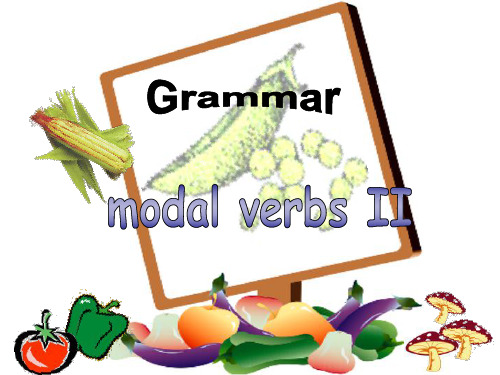
• We missed the bus so we had to walk home. • We have to overcome all kinds of
difficulties.
have to (考点)
• Have to 有多种时态。常见的有: • 一般将来时
• We will have to gather at the school gate at 7 tomorrow.
• 一般现在时
• I have to take more money with me because my girlfriend has so much to buy.
比较had better, should & ought to
• 三者均表示建议,意为“应该”,“应当”或“最好 做…”.
• 三者的语气程度为渐强。
• Had better指一般性的建议,最弱。
• Should&ought to含义相近,常可互换。区别在于, ought to常指特殊情况下的“应当”。Should则指一般 情况。见例句。
You ought to have helped him with his English, ________ ?
A.won’t you
B. ought not you
C. shouldn’t you D. wouldn’t you
他们想必已到那儿了。
They ought to be there by now. (语气较must 弱)
• 一般过去时 • Finally, we had to give up our idea to hold a picnic
- 1、下载文档前请自行甄别文档内容的完整性,平台不提供额外的编辑、内容补充、找答案等附加服务。
- 2、"仅部分预览"的文档,不可在线预览部分如存在完整性等问题,可反馈申请退款(可完整预览的文档不适用该条件!)。
- 3、如文档侵犯您的权益,请联系客服反馈,我们会尽快为您处理(人工客服工作时间:9:00-18:30)。
或其他时态时,就可以用be able to表示。
当我们要强调过去确实使用了某种能力时,要用 was(were)able to,而不用could。was able to表示“设 法干成某事”而 could只表示“具备某种能力”。 e.g. He is such a good swimmer that he was able to save the boys from drowning the other day. Could的用法 1。在过去的语境中,表示过去的能力、许可、可能。 2。若不是出现在过去的语境中,它就是表达委婉口 气。 could have done 表示对过去发生事情的推测。 e.g.I couldn’t speak English two years ago. Where could she have gone?
will and would
2)表示习惯(habit, custom) This old man is strange. He will sit for hours without saying anything. We would sit around Grandpa after supper, listening to his stories. 3)表示请求(request), 用于第二人称, would 比will 更委婉。 例如: Will you come this way, please? Would you open the window?
Unit 1
Festivals around the world
• Grammar
情态动词(Modal Verbs)
情态动词表示说话人对某一动作或状态的态度, 认为“可能”、“应当”、“必要”等等。但本 身词义不完全,不能单独作谓语动词,必须和不 带to的不定式(即动词原形)连用。情态动词没 有人称和书的变化。 can and could may and might will and would shall and should must and can’t
may, might, can, could
1. They (can/might) ___________be away for the might weekend but I’m not sure. 表示许可 2. You (may/might) __________leave now if you may wish. 表示请求 3. (could/may) __________you open the window a could bit, please? 表示猜测 4. He (can/could) __________be from America, could judging by his accent. 5. (may/can) ___________you swim? 表示能力 can 6. Listen, please. You (may not/might not) _________________ speak during this exam. may not
表示不允许
表示猜测
may, might, can, could
can not 7. They (can not/may not) _______________ still be out, the light is on in the house. 表示许可 8. You (couldn’t/might not) _________________ smoke on the bus. couldn’t 9. With luck, tomorrow (can/could) __________be a cooler day. 表示猜测 could 10. You (can/might) ___________ be right, might but I’m going back to check it. 表示猜测
can and could
So he can carry heavy books. ability He couldn't open the door by himself. ability Could you open the door, please? request
Can/could的用法。
will, would, shall, should, must:
表示禁止,不许可 mustn’t 1. We __________ smoke here, because the worker is carrying some petrol. 表示建议,命令 2. It is dangerous. You __________ should leave the room immediately. 3. He ___________ would go hiking with friends at weekends when young. 表示过去习惯 4. Write to me when you get home. will ---I ___________. 表示意愿 5. --Need I hand in my exercise book at once? --Yes, you__________. must 表示必须 表示肯定猜测 6. You have been working all day. You __________ must be very tired. should come 7. It is a long time since we met last time. You __________ and see us more often. 表示建议 8. Why don’t you try on this dress? It _________ look nice on will you. 表示将会,一定会
may and might
2) 表示许可(permission),表示允许 别人做某事, 也可征求对方的许可。 He may go now. We may keep the book for two weeks.
3) 用于祈使句,表示祝愿。 May you succeed! May you have a nice trip!
shall and should
1)shall 的用法 a.shall 在疑问句中用于第一,第三人称,表示征 求对方的意见。 Shall we put off the sports meeting until next month? Shall Tom go there with me tomorrow? b.shall 用于第二,第三人称,表示说话人给对方 的命令,警告,允诺或威胁。 You shall fail if you don’t work harder. (警告) He shall have the book when I finish reading it. (允诺) He shall be punished. (威胁)
2) 表示主观的命令、禁止 表示主观的命令、禁止时,主要指说话者主观的命令或强烈 的劝告。
You can go out with your friend but you must come back before 11 at night. ----Must I hand in the exercise today? ----No, you needn’t. 。
Can I keep the book for a few days ? You can’t be serious.(你不会是当真吧) She is two hours late .What can have happened? Can 和 be able to 的区别
1.can 和 could 表示能力时,有时可以用beve to
1.must用于一般问句中,肯定回答用must否定式 用 needn’t或don’t have to,做 “不必”,mustn’t 表示“禁止,不允许” — Must I finish all assignments at a time? —Yes, you must. No, you needn't. 2.表示“必须”这个意思时,must 和have to 稍有区 别。must着重说明主观看法,have to 强调客观需 要。另外,have to 能用于更多时态。 I don’t like this TV set. We must buy a new one. There was no more bus. They had to walk home.
must and can’t
3)表示猜测,语气非常肯定,近乎确定的意味, 一般用于肯定句,意为肯定……。其否定为can’t , 意为不可能…... 。 You must be ill. I can see it from your face. He can’t be at home. I saw him in the classroom just now.
表示猜测(不可能)
will and would
1)表示意愿 表示愿意做或主动提出做,如意志,愿望或决心
That bag looks heavy, I’ll help you with it. ( offering to do sth) ---- You know that book I lent you. Can I have it back if you’ve finished with it? ---- Of course. I’ll give it to you this afternoon. (agreement) Thanks for lending me the money, I’ll pay you back on Friday. (promise)
